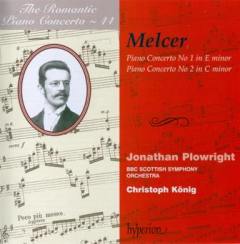Henryk Melcer - Piano Concertos Nos. 1 & 2 (Plowright) [2008]
Henryk Melcer - Piano Concertos Nos. 1 & 2 (Plowright) [2008]

Concerto for piano & orchestra, No 1 in E minor (29:11) 1 Maestoso 2 Andantino 3 Vivo Ma Non Troppo E Poi Molto Accelerando Piano Concerto No. 2 (37:26) 4 Allegro moderato 5 Andante Non Troppo Lento 6 Allegro con fuoco Jonathan Plowrigh – piano BBC Scottish Symphony Orchestra Christoph König - conductor
The latest instalment of Hyperion's The Romantic Piano Concerto series – number forty-four, no less – delves into the music of Henryk Melcer (1869-1928), an esteemed pianist who studied in Vienna with the renowned Theodor Leschetizky before himself becoming one of the most influential piano teachers of his generation in his native Poland. Melcer – along with Scharwenka, Moszkowski, Paderewski and Stojowski – is one of five Polish composers, all born between 1850 and 1869, represented in this series of recordings whose concerti serve to confirm that a country with such a rich pianistic history need not rely solely upon Chopin for nationalistic concertante keyboard repertoire.
Both of the works presented here were prize-winners in their day. The second and third movements of the Piano Concerto No. 1 in E minor (1892-4) formed part of Melcer's successful portfolio for the prestigious Second International Anton Rubinstein Competition in 1895. It is easy to see why the panel of jurors looked favourably upon Melcer's Concertstück. The wistful Andantino, full of luscious (if somewhat predictable) harmonic progressions, serves as a wonderfully atmospheric introduction to the restless Vivo ma non troppo e poi molto accelerando. Influenced by the dance tradition of the composer's homeland, the work presents some delightful orchestration alongside a riveting solo part that ranges from the delicate to the demonic. The Maestoso first movement, withheld from the Rubinstein Competition in order to meet requirements, is equally accomplished, with soaring melodies and a captivating (if slightly contrived) fugato shortly before its climax.
Melcer's second Piano Concerto in C minor (1898), jointly awarded the concerto prize in the Paderewski Competition of the same year, is somewhat more adventurous, both in form and content. This is particularly true of the opening Allegro moderato, a reflective and inward-looking work whose music seems to exist for large periods in the shadows of a looming sinister presence. The movement is not all doom and gloom, however, as it occasionally threatens to break free of its burdensome restraints, not least during the angst-ridden piano cadenza. Though the ensuing Andante non troppo lento has shed some of the predictability of its counterpart in the E minor Concerto, its decidedly agreeable lyricism nevertheless fails to strike one as extraordinary. This is partially due to the infectiousness of the Allegro con fuoco finale, the swirling principal theme of which is as beguiling as any I have heard in this series. It acts as an ideal foil for the sword that is the heroic, chorale-like second subject. Unfortunately, Melcer succumbs to a moment of compositional weakness in the coda, with a rather unconvincing switch to triple metre (though the performers and sound engineers are partially to blame for this perceived Achilles' heel, as both parties seem to momentarily lose their way, making it harder for the listener to adjust).
This relatively minor faux pas is something of an anomaly, as the musicians Hyperion have provided are worthy advocates of this repertoire. Jonathan Plowright provides a masterclass in dexterity at the keyboard, rising to meet all of the composer's challenges with a combination of scintillating virtuosity and deft sensitivity. The end of the C minor Concerto's opening movement is particularly telling, as he delivers the brilliant cadenza with utter authority before gently whisking the music away with a flourish of almost impossibly quick semiquavers. Plowright is adroitly partnered by Christoph König and the BBC Scottish Symphony Orchestra, who more than do justice to Melcer's imaginative orchestrations whilst also relishing the frequent interplay between soloist and ensemble.
Of the many sumptuous concerti unearthed thus far by Hyperion in their laudable survey of the romantic piano repertoire, some of the most noteworthy revelations have been the four examples by Scharwenka, the continued absence of which from the concert hall is nothing short of a travesty. Though Melcer's compositions are perhaps not of quite the same calibre as those of his elder countryman, they are nevertheless highly engaging pieces that bear repeated listening. --- William Norris, musicalcriticism.com
download: uploaded anonfiles mega 4shared mixturecloud yandex mediafire ziddu
Last Updated (Thursday, 18 July 2013 15:57)








